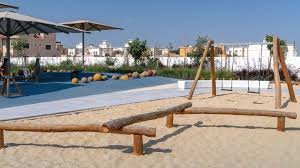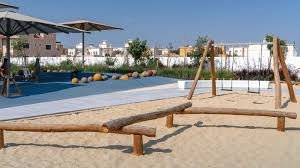Abu Dhabi is setting a new benchmark in urban development with the unveiling of 33 new parks designed to cater to local communities. This ambitious initiative is part of the emirate’s broader efforts to enhance public spaces, promote inclusivity, and provide accessible green havens for residents of all ages and abilities. The project underscores the importance of public spaces in fostering social connections, improving mental well-being, and encouraging an active lifestyle.
A Vision for Community Well-Being
The introduction of these parks aligns with Abu Dhabi’s long-term vision of fostering a healthier, more connected, and environmentally sustainable urban landscape. Designed with input from urban planners, environmental experts, and community representatives, each park serves as a unique recreational hub tailored to the needs of its surrounding neighborhoods. The initiative reflects the growing emphasis on creating inclusive environments that cater to people of all backgrounds and abilities, reinforcing Abu Dhabi’s commitment to progressive urban planning.
These new parks will play a vital role in promoting public health by offering spaces where residents can engage in physical activities, unwind in nature, and participate in community events. Studies have shown that access to green spaces significantly enhances mental health, reduces stress levels, and strengthens community bonds. By prioritizing parks in urban development, Abu Dhabi aims to create a city that values both its environment and the well-being of its people.

Key Features of the New Parks
The 33 newly launched parks are strategically distributed across various districts, ensuring equitable access for residents. Key features include:
- Inclusive Playgrounds: Specially designed play areas that cater to children of all abilities, including sensory-friendly and wheelchair-accessible zones. These playgrounds will be equipped with adaptive swings, tactile play elements, and interactive sensory paths to ensure that children of determination can participate equally in recreational activities.
- Fitness and Wellness Zones: Outdoor gym facilities, jogging tracks, cycling paths, and meditation spaces will encourage an active lifestyle for individuals of all ages. The integration of calisthenics stations and stretching zones will cater to fitness enthusiasts, promoting physical well-being in an outdoor setting.
- Sustainable Landscaping: The parks will feature eco-friendly designs with native plants, water-efficient irrigation systems, and shaded seating areas to create a pleasant environment while conserving resources. These green spaces will contribute to Abu Dhabi’s sustainability efforts by reducing urban heat islands and improving air quality.
- Cultural and Educational Spaces: Open-air amphitheaters, art installations, and learning zones will provide platforms for local artists, cultural performances, and educational workshops. These spaces will serve as hubs for creativity and knowledge-sharing, fostering a deeper connection between residents and their cultural heritage.

A Commitment to Accessibility
A key focus of the initiative is to make public spaces more accessible to people of determination. The parks incorporate wheelchair-friendly pathways, adaptive recreational equipment, and braille-encoded navigation guides to ensure inclusivity for all visitors. By prioritizing universal design, Abu Dhabi aims to set a regional precedent for barrier-free community spaces.
Accessibility in public spaces has been a long-standing challenge, and Abu Dhabi is taking significant strides to address it. The inclusion of tactile paving for the visually impaired, seamless entry points for wheelchairs, and dedicated quiet zones for individuals with sensory sensitivities are part of the extensive planning efforts. This initiative ensures that people of all abilities can experience the joy of outdoor spaces without limitations.
Environmental and Social Impact
The development of these parks is expected to have far-reaching benefits, including:
- Enhanced Quality of Life: Green spaces contribute to mental and physical well-being by providing stress relief, encouraging physical activity, and fostering community engagement. The serene environment of the parks will serve as an escape from the urban hustle, offering a space where individuals can relax and rejuvenate.
- Community Engagement: The parks will serve as gathering points for local events, cultural festivals, and family activities, strengthening social bonds within communities. With dedicated zones for picnics, social meetups, and collaborative projects, these parks will nurture a sense of belonging among residents.
- Sustainability Efforts: By integrating eco-friendly designs, the initiative aligns with Abu Dhabi’s environmental commitments and climate action goals. The implementation of solar-powered lighting, rainwater harvesting systems, and carbon-reducing landscaping will further support sustainability efforts.
- Economic Growth: The development of parks can have a positive economic impact by increasing property values in surrounding areas, attracting tourism, and encouraging local businesses such as cafés, food stalls, and outdoor activity vendors.
The Role of Smart Technology
Abu Dhabi’s new parks will also incorporate smart technology to enhance visitor experiences. Smart lighting systems will adjust based on occupancy levels, ensuring energy efficiency while maintaining security. Interactive digital kiosks will provide park-goers with real-time updates on events, weather conditions, and available amenities.
Additionally, AI-powered waste management systems will ensure cleaner environments by optimizing garbage collection and minimizing litter. The parks will also feature free high-speed Wi-Fi zones, enabling visitors to stay connected while enjoying the outdoors. These innovations position Abu Dhabi’s parks as leading examples of modern urban green spaces that integrate technology with nature.
Future Expansion and Development
Officials have indicated that this is just the beginning of a broader strategy to enrich public infrastructure. Additional parks and green corridors are planned to further integrate nature into urban living, reinforcing Abu Dhabi’s reputation as a forward-thinking city that prioritizes community well-being.
Future expansion plans will also focus on waterfront parks, rooftop gardens, and vertical green spaces to maximize land use and provide diverse recreational opportunities. Collaborations with environmental organizations and landscape architects will ensure that upcoming projects align with global sustainability benchmarks.
Conclusion
With the launch of 33 new parks, Abu Dhabi continues to transform into a greener, more inclusive metropolis. This initiative not only enhances recreational opportunities but also strengthens the social fabric of the city. By ensuring accessibility, sustainability, and community engagement, these parks serve as a testament to Abu Dhabi’s commitment to creating a vibrant and inclusive urban environment for all.
By prioritizing both nature and innovation, Abu Dhabi is shaping a future where urban spaces seamlessly blend with environmental consciousness, fostering a higher quality of life for residents and visitors alike. The 33 new parks are more than just recreational areas; they are symbols of a city that values inclusivity, health, and sustainability at its core.
Do follow Uae stories for more Updates
UAE Launches National Program to Promote Sustainable Agriculture Practices













